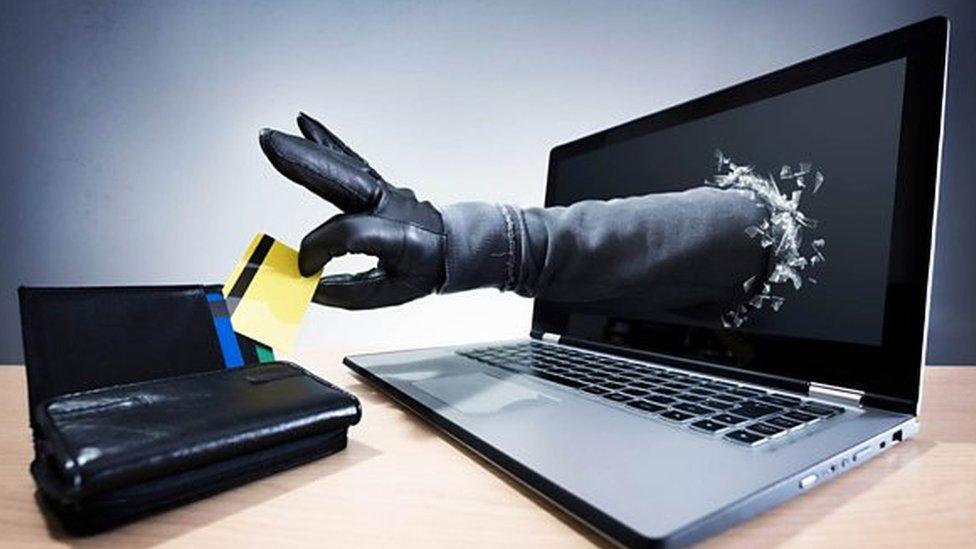Romance scam victim 'bled dry' as fraud cases spiral
- Published

South Wales Police carry out 1,000 fraud cases a week, a senior police officer says
The victim of a scam who took out £17,000 of loans has said she was "bled dry" by a man she met on a dating app.
The woman in her 40s from north Wales "dated" the man via video chat for two years - he used computer graphics to create a fake face when they spoke.
A report has found fraud across Wales and England accounts for one in three crimes - but only 2% reach court.
A senior officer estimated 1,000 cases a week could be happening in the South Wales Police force area alone.
"This guy's absolutely bled me dry," the victim of the scam told Eye on Wales on BBC Radio Wales.
"I think he would have pushed me into a grave."
Police are now liaising with Interpol to find the man.
The scammer told his victim after they met that he was an international businessman based in Dallas, Texas, a city she had visited several times.
She said: "He was claiming that he was looking to buy a premises and to basically move across to the UK so he could set up his business here and he was due to fly back to Dallas - that night, I think - or the following day.
"So he video called me as soon he got back to Dallas and basically he would be video calling on a daily basis. And he just built the trust up from that and to a point where everybody trusted him.
"Even my friends trusted him because he had video calls with them."
But he had taken a photograph from the internet and digitally manipulated it to move convincingly while he spoke.

The woman said she had discussed marriage with the scammer
After a couple of months, he said he was in trouble on a business trip to Dubai, claiming a girl had run in front of his hire car and he had to pay her medical bills in order to have his papers returned.
"Now I looked into all of this because I thought 'hang on a minute, something doesn't seem right here' but then when I looked, everything made sense.
"So I sent him the money to pay for fees because what he also sent me was a picture of him sat with the girl in hospital.
"I didn't think anything of it. She was on a ventilator. It looked genuine. There was nothing on this picture that screamed 'this is a fake'."
The woman took out a £6,000 loan and sent him the money, saying she had "fallen for this guy in a major way".
But his apparent troubles kept piling up.
Claiming he was on his way to the UK to visit her, the man said he was stopped for an unpaid tax bill of £21,000.
The woman paid it with more loans - and help from one of her friends.
But his next attempt included copies of clearly faked documents and the woman realised she had been scammed.
"I just wanted to cry. My friends had to sit with me for a few days just to support me."
She is now working two jobs, and starting a third, to pay off the debts he has caused.
Fraudsters are also sharing so-called "suckers lists" to target vulnerable people repeatedly, according to Det Insp Nick Bellamy, who heads the organised crime unit at South Wales Police.
He said: "It's huge. I don't think it's a crime that we're going to investigate our way out of or certainly arrest our way out of it.
"Fraud is theft with a trick and what we want to try and do is to make sure people are able to spot those tricks."
Eye on Wales is on BBC Radio Wales on 12 February at 18:30 GMT, or listen on BBC Sounds
- Published25 January 2020

- Published8 November 2019

- Published17 October 2019
